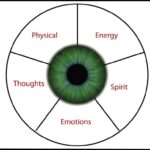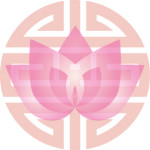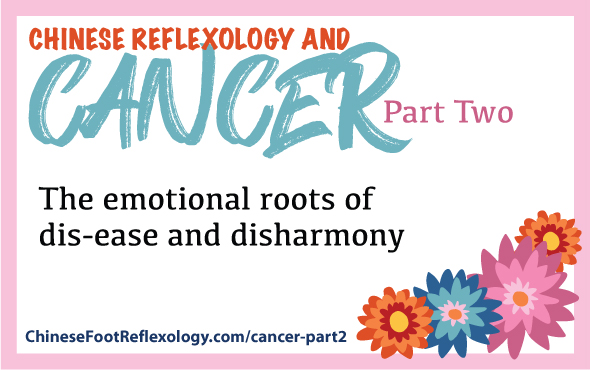
If you or a loved one has cancer and you’re researching alternative therapies, here’s Part Two of my article on how Traditional Chinese Medicine, Chinese Reflexology, and the Mind Body connection can help the body return to balance.
I wrote Chinese Reflexology and Cancer, Part One several weeks ago, and that article examines the Western and Traditional Chinese Medicine perspectives on cancer. It’s really important to note this distinction because it’s the difference between finding a cure for cancer (which currently does not exist—read the article to understand why I wrote this) and not looking for a cure, but instead, supporting the body in healing itself.
Part One contains very important background information that will help you better understand and use the information in this article, Part Two, to support your body in restoring balance for your health and well-being.
In this article, you’re going to learn about the mental and emotional roots behind the energy disharmonies that impact health and vitality. Or in the context of an article about cancer, this is about understanding the emotional roots that create conditions in the physical body that make it more susceptible to manifesting symptoms that Western doctors might diagnose as cancer.
We’ll get to all of that in just a sec, right after I remind you that Part Three will cover Chinese Reflexology points to support your overall health and well-being. Please don’t skip any of the parts of this three-part article because these first two parts create the framework and foundation for understanding how Chinese Reflexology supports the body’s natural healing process.
When you have this knowledge, you start shifting from being someone who is simply rubbing their feet, to someone who is massaging with the intention to restore balance and vitality.
Why It’s Important to Understand the Emotional Roots
Ever notice that some people get cancer, get treated, but then the cancer returns? Why? Why doesn’t Western medicine focus more on eliminating the root cause of the cancer? Is it ignorance? Is it complacency? Or is it because there isn’t ONE root cause? Many variables come into play. Even if you were only looking at physical factors such as lifestyle and environment, there would be so many variations for each individual. Gender, age, sleep, diet, exercise, ethnicity, lifestyle, etc. etc.
With so much variability even at just the physical level, it’s not surprising that the emotional roots of disease are often overlooked. They’re impossible to examine objectively, and sometimes it’s hard to even figure out what’s going on in yourself—let alone another person!
We humans are just so complex. There are many many many layers, and often we hide or bury our darkest feelings from ourselves. Yup, putting my hand up for this one!
But emotions influence many of our conscious decisions. For example, if you had a bad relationship, you tend to look for a mate with the opposite qualities in your new relationship. I used to work for an online dating site, and part of my job was to understand our customers, so I spent many hours reading online dating profiles. After looking at hundreds, maybe thousands, of online dating profiles, I noticed a pattern.
You could always spot who recently broke up with someone because their emotions influenced what they wrote in their dating profile. Their hurt and pain was exposed to the world if you read between the lines.
“I’m looking for someone who is independent (my ex was clingy, smothering, or controlling), honest (my ex cheated on me), not into games (we had a tumultuous relationship), fun (we no longer enjoyed each other’s company), and employed (yep, people would write this, meaning they used to pay for everything, and didn’t want to do this anymore).”
So you can see how a person’s feelings influence what they write in an online dating profile, and that influences the type of person they attract, and that influences the relationships they have in the future.
Aside from affecting your actions, your feelings also influence the flow of qi in your body. For a quick refresher on qi and why it’s so important that it’s flowing as it should, please revisit Part One.
Underlying Emotions and Chinese Medicine
Let’s look at emotions with respect to Traditional Chinese Medicine (TCM) theory, specifically the disharmonies that result in toxins and energy blocks that can lead to the formation of abnormal growths.
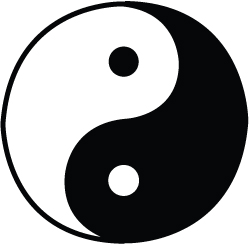 First, you need to understand that in order for the body to be in balance, the yin and yang elements in your body need to be in balance. In terms of anatomy and physiology, yin is the anatomy and yang is the physiology. Yin refers to blood, fluids, organs, and structures, whereas Yang refers to the qi, energy, processes, and functions.
First, you need to understand that in order for the body to be in balance, the yin and yang elements in your body need to be in balance. In terms of anatomy and physiology, yin is the anatomy and yang is the physiology. Yin refers to blood, fluids, organs, and structures, whereas Yang refers to the qi, energy, processes, and functions.
1. Toxins
From a TCM perspective, toxins are generated when there’s too much “heat” in the body, and too much “phlegm.” And in this case, heat doesn’t just mean temperature. It refers to the overall balance of balance of yin and yang in the body. Also, please keep in mind that I’m condensing 2,000 years of Chinese Medicine theory into a few paragraphs, so this is a bit of an oversimplification. It’s enough to explain the basic concepts and the role of emotions and thoughts.
When the body has “heat,” it means that there’s either too much yang or that the yin is too weak to keep the yang in check. So what causes heat in the body? Well, there are physical elements like diet and lifestyle. Things that are considered “hot” include intense exercise, stress, anger, alcohol, and even spicy foods. “Heat” can even be used to describe the body’s pH level, where too much heat would be a body that’s too acidic.
Notice how there are emotions that are considered hot. What comes to mind when you hear the phrase, “hot-headed” or that someone is “steaming mad”? The clues are right there in our language. Even lighting a fire under yourself, or trial by fire, convey the impact on the human body. Stress causes heat in the body.
However, the human body is generally quite resilient. It can bounce back from a stressful period. However, if you’re constantly in a state of stress, or you’re feeling frustration, anger, and resentment for days, weeks, months, or even years, then these emotions disrupt your body’s state of balance. That’s when you begin to experience physical disharmony. There’s too much heat in certain areas, organs, and/or energy meridians causing the yang element of the body to be out of balance.
This internal heat can lead to the formation of “phlegm.” In Chinese Medicine, phlegm isn’t just the snotty stuff that comes out of your nose when you have a cold. Think of it as a “congealing“ of the fluids in the body, where the yin elements like blood and lymph get thicker and slower moving.
This occurs because the internal heat causes the fluids to congeal—just like cooking oatmeal on the stove. The liquid evaporates and you get a thick porridge. While it’s not that dramatic in the body, the heat can definitely affect the balance and health of the yin element in the body.
2. Energy Blocks
As you learned in Part One, it’s the combination of toxins and stagnant energy that results in the toxins accumulating in the body, which creates the breeding ground for abnormal growths to form. So in order for this accumulation to occur, there have to be toxins present, but the qi also has to be stagnant and not flowing smoothly.
The heat generated from hot toxic emotions like anger, stress, and frustration—they cause the liquid, the yin, to become thicker and more viscous. When the fluids are thicker, the flow slows down, allowing toxins and waste to accumulate more easily in the body. So think of it like a river that has lots of muddy water. The water becomes heavy, thick, and sludgy, and then the current is no longer as strong. It’s like a river made of mud versus clear water.
So if the blood is not flowing as easily in the body, it becomes phlegm-like, thick, heavy, and slow. Then the combination of heat and phlegm causes more toxins to gather because the body is not flushing them out efficiently.
The Liver’s Role
In Chinese Medicine, there’s one organ and energy meridian that plays a very important role in ensuring the smooth flow of qi throughout the body—and that’s the Liver. It helps move qi, which helps move blood, and keeps everything flowing and working as it should.
When things aren’t flowing, they can start to stagnate, and the stagnation can lead to all sorts of problems ranging from headaches to other types of pain, menstrual issues, infertility, insomnia, or build-ups in the body that could lead to cysts or abdominal growths.
There are certain emotions that are particularly harmful to the Liver, and those would be anger and frustration. Any type of stress or tension affects the Liver. A heavy toxic load also affects the Liver—so this would include excessive alcohol consumption, taking medication for a long period of time, drugs, or a lot of toxins in the diet—because the Liver has to process all of this stuff.
Dragon Spirit Perspective: Your Achilles Heel
However, it’s not just the heat and anger that causes energy to become stagnant or blocked. There are other emotional roots. So what constrains the flow of qi? Think again of a river. What causes the flow of the river to slow down or get blocked? Either not enough water, the muddying (aka thickening) of the water, or an obstruction that causes the river to narrow or get constricted in certain areas.
Okay, so we’ve already discussed the “thickening,” so here’s the Dragon Spirit perspective: The areas where qi is most likely to be congested are the Achilles heel areas in the body.
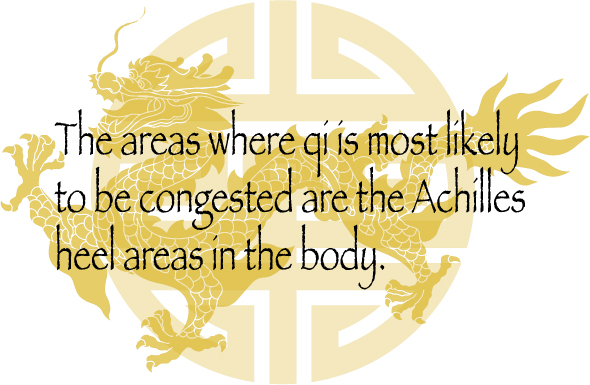
Now there are two things for me to explain. Let’s first address what Dragon Spirit is. (I really need a separate blog post about this!) Everyone has a Dragon Spirit inside them. It’s not an entity or spirit separate from yourself. Instead, it’s the voice within that craves adventure and exploration and also knows the most expansive answers to your questions. It’s your connection to your heart and soul. It’s your intuition with a cool sounding name :).
Now I’ll explain about the body’s Achilles heel. It’s why emotions matter because:
Thoughts and feelings stored in the body or directed consistently to one area of the body create the Achilles heel of qi in your body.
These are areas where negative thoughts and feelings are held or have been directed for years. And over time, these thoughts and emotions have been disrupting, constricting, and blocking the flow of qi.
When a person has one area of the body that is a repository—or you could also say a bullseye for negative emotions and judgments, then the that becomes the target zone for toxins to congregate. It’s the Achilles heel in the body where any emotions—not just anger—are disrupting the flow of qi. This includes the whole spectrum of human emotions, including sadness, grief, envy, bitterness, spite, irritation, resentment, pain, shame, guilt, fear, anxiety, disappointment, and the list goes on.
It’s normal to get mad and feel negative emotions. As I mentioned earlier in this article, our bodies are very resilient and self-regulating. So you can experience negative emotions, feel them, and then let them go. But if you hold onto them, this is what starts to shift the energy balance in your body. It’s not just people who are outwardly angry or emotional who create disharmony in their bodies.
Sometimes it’s the ones who appear least affected who are the most affected. For example, if you weren’t allowed to express anger as a child, then you may be bottling it all up inside. And you may have become so used to it, that you don’t even realize you’re angry.
I once had a Home Economics teacher who had a strange quirk where she would yell at you with a smile plastered on her face. It was the weirdest thing where you could tell she was irritated by the class, but then she’d bare her teeth in the semblance of a smile, and with a saccharin voice tell the class to quiet down—in a raised voice, I might add. (Ooh, looks like there’s still a little bit of snarky teenager inside me.)
Seriously though, looking back, I can’t help but wonder how much anger she suppressed inside. And now that I’m no longer a snarky 13-year old kid, I can see her with much more compassion.
So I think we’ve sufficiently established that anger, stress, and negative emotions wreak a lot of havoc in the body. These emotions don’t have to be expressed either, and perhaps that’s where the biggest danger lies. When you hold the emotions inside, they simmer. Anger can “cook” your yin—the blood and fluids in your body. They cause qi and blood to stagnate, and this creates the perfect recipe (sorry, couldn’t resist the metaphor) for toxins to build up in the body.
The Importance of Awareness
So what do you do? Well, that’s a whole other article (or maybe even an entire website!) to discuss. But I can most definitively say that awareness is the first step. When you become aware of how emotions affect your qi, then you can begin to clear them. One of the best ways to do this is to be an objective observer of your own life. When you are in the throes of experiencing stress and negative emotions, can you take a step back and see yourself as an impartial observer?
The act of stepping back helps you put things into perspective. We initially react instinctually, triggering a fight or flight response. It’s why you can say something in the heat of the moment that you’ll regret later. If you have the awareness while you’re experiencing the emotion to be aware of it, then you can break the circuitry that triggers the initial reaction. Greater self-awareness leads to greater clarity.
In my online programs, I guide students into what I refer to as the Dragon Spirit space. This is where your mind is quiet so that you can hear the messages from your heart and soul. This is how you tap into the power of your intuition. While it’s way beyond the scope of this article, I can point you in the direction to learn more.
There’s a Dragon Spirit meditation on YouTube that you can listen to for free. It’s a short 15-minute meditation that will help you tune into your connection with the Universe. Through this connection, you can experience clarity and insights to support your health and well-being. By quieting the mind, you’re better able to hear your inner guidance, and you’re more connected with your body and what it needs to heal and thrive.
In addition, in my book, Sole Guidance, I write about the three catalysts for healing. The first catalyst is healing with the mind, and the book contains several chapters on the mind body connection and how you can access your Dragon Spirit (inner guidance) to clear stuck emotions that are affecting your health and well-being. I also teach two online programs on Chinese Reflexology where I guide students into the Dragon Spirit space.
The Need for a Gentle Approach
Next month, I’ll write Part Three of this article on how Chinese Reflexology and Chinese Medicine theory and diet copy can help restore balance in the body. But before you run off and massage your feet, I have to caution that someone with cancer is especially at risk of detox symptoms and exacerbating their condition if they massage their feet without proper guidance and instruction.
For example, I mentioned the Liver in this article and that might cause someone to conclude that massaging their Liver point would be a good thing to do. However, that’s one of the WORST points for a seriously ill person to massage. If you try flushing toxins out of the Achilles’ heel in the body, and only focus on flushing out toxins and moving the qi through the area, then the body is going to be overwhelmed with toxins. Its organs are going to be flooded with toxins.
For someone who is chronically ill or has a chronic condition, this is going to be too much for their system to handle. They need a much gentler approach. That’s why I teach the 6-week Sole Fundamentals Program because you start working on strengthening the organs that help flush toxins out of the body first, and you start with a gentler massage approach.
When you support the body in flushing out toxins, that helps the body heal itself and bring itself back into balance. When you strengthen the body’s ability to flush out toxins, this helps take some of the load off. The body doesn’t have to work as hard because it no longer needs to apply all of its resources to deal with the toxins. Instead, it can start focusing on healing.
Okay, that’s it for my little lecture cautioning anyone with a serious disease against randomly massaging their feet.
Please remember in order to restore balance in your body, you need to take a balanced approach to healing. Patience, Grasshopper. Part Three should be ready for you next month. And in the meantime, go listen to a Dragon Spirit meditation, or read a book :).
